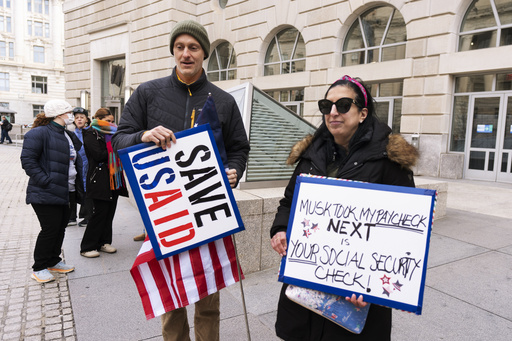WASHINGTON — A warning from a government oversight agency revealed that nearly all tracking capabilities for $8.2 billion in unspent humanitarian aid have been lost by the U.S. Agency for International Development (USAID). This situation follows the freeze on foreign funding enacted by the Trump administration and the consequent suspension of many USAID employees.
The rapid dismantling of the agency has left its monitoring processes “largely nonoperational,” according to the inspector general’s office at USAID. This loss of oversight means there is now a diminished ability to ensure that humanitarian assistance does not fall into the hands of extremist groups, nor be misdirected in conflict-stricken or unstable regions. Furthermore, the inspector general pointed out that the administration’s actions have significantly hindered USAID’s ability to distribute and secure crucial humanitarian assistance, with the potential risk of millions of dollars’ worth of supplies going to waste as staff were barred from delivery.
The inspector general also voiced ongoing concerns about USAID’s oversight practices, highlighting long-term issues that have plagued the agency. Adding to the turmoil, the Trump administration, with the support of billionaire Elon Musk, has accelerated the dismantling process of USAID. The General Services Administration, responsible for government properties, recently informed that USAID had been removed from its lease at the agency’s Washington headquarters.
On a disheartening day for many employees, some clad in USAID merchandise found themselves blocked from reaching their offices. Security personnel and officials even urged some to leave, with one USAID official telling staffers, “Go home. Why are you here?” This eviction of staff from a building they had occupied for many years occurred after a court issued a temporary injunction against a Trump administration directive that aimed to remove most USAID workers from their positions globally.
In response to the actions taken against USAID, two employees’ groups that filed a lawsuit concerning the administration’s targeting of the agency sought a court finding of violation against the Trump administration, pointing out that workers continued to be barred access to essential systems. They expressed mounting concern that the administration seemed poised to undertake irreversible actions dismantling the agency before a final verdict could be rendered.
Both Trump and Musk have shifted their focus toward various government offices for reform, but USAID has faced some of the most severe backlash. They claimed the agency’s global efforts were inconsistent with Trump’s policy objectives and perceived as wasteful. One prominent Trump appointee involved in these sweeping changes defended the agency’s closure in recent court filings, citing issues of “noncompliance” and “insubordination” among staff members.
Peter Marocco, deputy administrator of USAID, submitted a statement in response to the lawsuit, suggesting staff hesitation contributed to the need for staff reduction to approximately 600 employees. Following an executive order from Trump issued on January 20 that froze foreign assistance, USAID’s operational processes faced a complete shutdown, resulting in mass layoffs. Secretary of State Marco Rubio attempted to alleviate the fallout by issuing a waiver for emergency food and critical programs.
However, officials at USAID and various aid organizations claim that neither the funding nor staffing levels have been reinstated sufficiently to resume essential initiatives. The Norwegian Refugee Council declared the U.S. funding cessation as the most devastating in its nearly eight-decade history, stating that it would cease services impacting countless vulnerable individuals in various countries.
The organization highlighted the gravity of the situation, citing its unique role in providing critical resources to struggling populations, such as clean water in Burkina Faso and subsidized bread for starving communities in Sudan. In a recent interview, Trump speculated that a few aid projects might resume under the purview of Rubio.
Aid organizations warned that recovering from the damage inflicted would necessitate significant investment to regenerate many programs. In a pivotal legal move, U.S. District Judge Carl Nichols recently blocked an order from the Trump administration which would have sent thousands of USAID employees on forced leave and required overseas staff to return to the U.S. within a tight deadline.
Although the judge mandated the restoration of agency email access for affected staff members, their headquarters remained inaccessible. Reports indicated mixed experiences among staff—in some cases, email services had been resumed, while others remained locked out. The inspector general’s advisory notice warned that the administration’s cuts could eliminate 90% of personnel in the Bureau of Humanitarian Affairs.
The cessation of funds has meant that monitors tasked with ensuring that U.S. aid does not reach groups like ISIS, Hezbollah, and Hamas have not been allowed to work, according to the oversight office. The office also highlighted its previous insistence that USAID increase training for its staff to properly screen and manage aid distribution.
As confusion reigned, numerous employees arrived at the USAID office, uncertain due to conflicting communications regarding their presence. An agency-wide email from the administrator’s office clarified that the “former USAID headquarters” and other offices in Washington would remain closed indefinitely.



